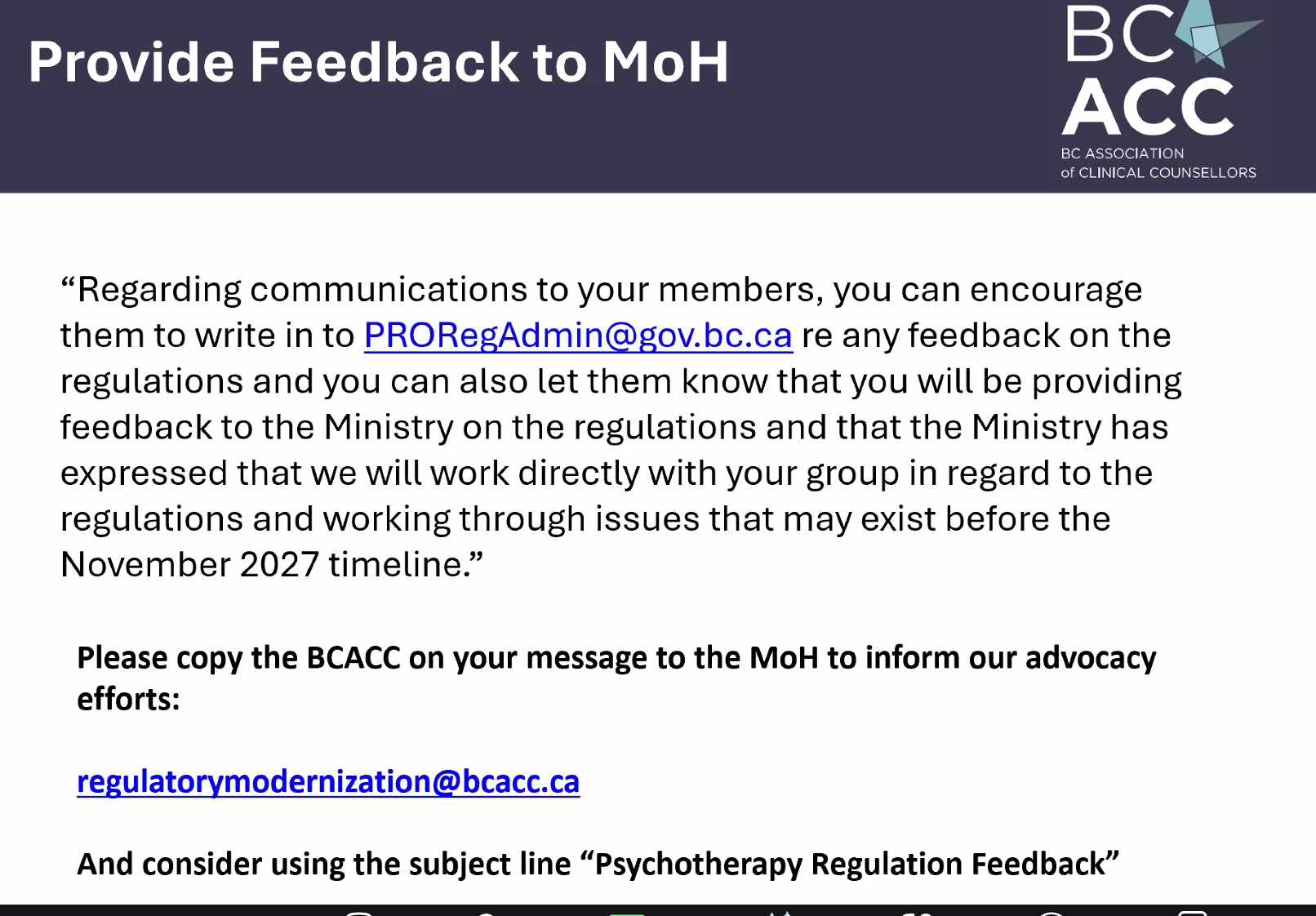Understanding Counsellor Regulation in BC: Highlights from the BCACC Webinar
Today’s BCACC webinar offered some important updates on the future of counselling regulation in British Columbia—and while there’s a lot still in development, there are a few key takeaways I want to share.
Before we dive in: I am not part of BCACC’s administration, and this post is not an official summary. Please always refer to BCACC’s member portal for the most accurate, up-to-date information.
Regulation Is Coming—But Slowly
The main message? This isn’t happening overnight. The registration process for the new College of Counselling and Psychotherapy of BC is not expected to begin until November 2027. So while it’s important to stay informed, there’s time to prepare.
BCACC Will Still Exist
One point of reassurance: BCACC is not going anywhere. They will eventually pass some functions over to the College, but they will remain a separate organization and membership with BCACC will still be an option, even once the College is up and running.
The Role of “Psychotherapist” in Regulation
The BC government will be using the term psychotherapist in the new regulatory framework. According to their working definition, psychotherapists will have a scope similar to psychologists—with the exception of diagnostic privileges. That said, BCACC is advocating for us to be able to provide “smaller” diagnoses as part of our work.
Only those licensed by the new College will be legally allowed to call themselves a psychotherapist—bringing us in line with provinces like Ontario and Quebec, and with international standards.
Grandparenting and RCCs
For those of us who hold the RCC designation, BCACC is committed to creating a grandparenting pathway into the College to avoid some of the challenges seen in Alberta. In unregulated provinces, the RCC designation will continue to be relevant and usable.
What You’ll Need to Register
While not all details are finalized, here’s what we do know about the registration requirements:
Proof of your education
Attestation of your clinical hours worked
Attestation of supervision received
A jurisprudence exam (likely 20 questions, open book)
Participation in a Quality Assurance (QA) program
A letter of good standing from BCACC
Attestation of any unfinished undertakings
A clean criminal record check
The anticipated annual fee for College registration will be at least $1200.
Big News for Group Practice Owners
Here’s where things get complicated—especially for those of us who run group practices.
One of the current regulations states that only health profession corporations will be allowed to provide psychotherapy services to the public. This means that unless you incorporate specifically as a health profession corporation, you may not be able to legally operate a group practice that offers psychotherapy.
The BCACC is already advocating on this issue and has flagged it as a major concern to the Ministry of Health. They’re encouraging members—especially group practice owners—to add their voices to the conversation.
If you’d like to advocate, you can send an email to:
📩 PRORegAdmin@gov.bc.ca
📩 Copy: regulatorymodernization@bcacc.ca
📌 Subject line: Psychotherapy Regulation Feedback
The more feedback they receive, the more likely it is that practical concerns like this one will be taken seriously.
Still Many Unknowns
It’s important to note that many registration details are still being decided. For example, there will be no automatic porting of designations—just because you hold a certain title doesn’t guarantee you’ll qualify. That said, the government has indicated they will consider work experience as part of the process, which is reassuring for long-standing practitioners.
BCACC has also been in touch with CRPO (College of Registered Psychotherapists of Ontario), who shared the criteria they used during their own regulatory rollout. So there’s a framework to work from.
Final Thoughts
While it’s easy to feel overwhelmed by big system changes, it’s heartening to see that this transition is being approached thoughtfully—and with input from professionals on the ground. We have time to get ready, and BCACC appears committed to supporting us every step of the way.
Just a reminder—this is a personal summary based on today’s webinar. Please check the BCACC member portal for all official updates.
Let’s stay informed, support one another, and keep the conversation going.




